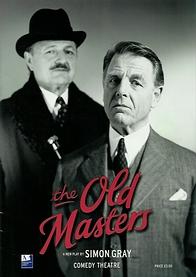The Old Masters
Simon Gray's latest play The Old Masters, which is set near Florence in 1937, looks at the relationship between Bernard Berenson, a distinguished art historian, and Joseph Duveen, a famous art dealer. The relationship was profitable for both men, Berenson attributing renaissance paintings to their 'rightful' artists and Duveen selling them to the highest bidder. However, the relationship is severed when Berenson refuses to attribute a painting "The Adoration of the Shepherds" to the artist Giorgione, insisting that Giorgione's student Titian painted the work. Gray imagines the final meeting between these two men, and explores questions of love, loyalty, authenticity, and corruption.
The play is set in a society in decline: Mussolini and his gang of fascist thugs govern Italy in a grip of fear; anti-Semitism is on the rise and WWII is soon to break on the horizon. Similarly Bernard Berenson (BB to his friends) is in similar decline: his ailing wife worries about how the bills are to be paid; his secretary and mistress Nicky feels neglected; and BB has become increasingly concerned that he has been corrupted by Duveen into making dishonest attributions of an artist's work. The decline is summed up by BB's and Duveen's mutual disdain for the new vulgar American entrepreneurs who care little for the aesthetic value of a painting, merely its market price.
The first act sets the background for the clash between the two colossal egos of BB and Duveen. BB wants to defend his standing as an art historian; Duveen wants BB to change his considered opinion about who painted "The Adoration of the Shepherds." Each man has a reputation to lose and when they meet in BB's library a game of wit and cunning ensues.
Edward Fox, as usual plays the role of a perfect English gentleman, which does not seem appropriate for the character of BB, a Lithuanian Jew who immigrated to America and ended his days in Italy. However, all can be forgiven as Edward Fox's inimitable acting is, as ever, captivating: the posh inflection to his voice; the smug sneer that loiters on his lower lip, and the graceful elegance he brings to every movement - suggesting years of study at a Gentlemen's finishing school. A brilliant portrayal of enigmatic candour.
Although Edward Fox is miscast, he perfectly accompanies Peter Bowle's conniving Joseph Duveen. Bowles enters BB's library and outstretches his arms for an embrace, and in a saccharine voice croons "BB". Bowles concocts a heady cocktail of ingratiating mendaciousness, carefully mixed with just a hint of menace.
The subplot concerns the two women in BB's life, his wife Mary (played resplendently by Barbara Jefford) and his secretary and mistress Nicky (Sally Dexter). The women share a friendship that is founded upon their devotion to BB and share his affections without acrimony or jealousy.
Although it is not always easy to follow the threads of deceit that are weaved together by Gray in this clash between BB and Duveen, Harold Pinter skilfully directs the play to pivot around the larger than life characters crafted by Edward Fox and Peter Bowles to great dramatic effect.
What other critics had to say.....
NICHOLAS DE JONGH for THE EVENING STANDARD says, "Tremendously acted production." PAUL TAYLOR for THE INDEPENDENT says, "Shrewd, beautifully articulated drama." MICHAEL BILLINGTON for THE GUARDIAN says, "The acting...is pure delight." CHARLES SPENCER for THE DAILY TELEGRAPH says, "In the final analysis, the piece is less illuminating about art, less touching in its account of human love...See it for Fox and Bowles, two wily old masters in their prime." BENEDICT NIGHTINGALE for THE TIMES says, "Fascinating play."
External links to full reviews from popular press
The Independent
The Guardian
Daily Telegraph
The Times
Originally published on
